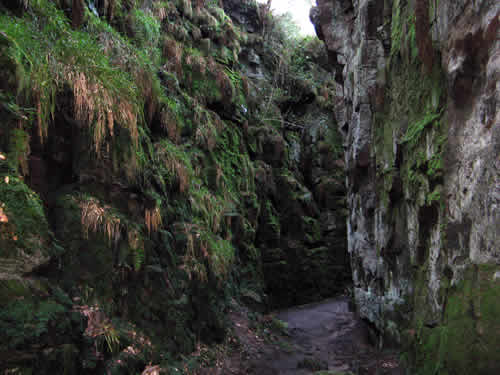The Last English Hobbits? January 16, 2016
Author: Beach Combing | in : Modern , trackbackLudchurch (aka Lud’s Church, Lud Church) is not a church. It is a haunted ravine in the English midlands, Staffordshire, that has been frequently associated with the supernatural. The photo above will hopefully give some idea of what it is like. It has also been associated with an underground race of hominids in caves that branch off from the ravine. In a book published in 1860 a local (Miss Dakeyne) describes how ‘until a few years ago, the subterranean cavern which issues from Lud Church, was inhabited by a strange and distinct race of beings’. That is the closest we have in nineteenth-century English writing to a claim that ‘hobbits’ (see Flores etc) still dwelt in the English countryside up until recent times: or at least that is what some of the folklore books of Staffordshire have suggested! In fact, the comment should rather be read in a different key. Miss Dakeyne wrote a long poem about Ludchurch and a supernatural encounter here. The sentence above is in a footnote associated with the claim that a visitor who climbed into caves heard a cock crow underground. Miss D also tells of a recent adventurer:
This inner cavern, which is entered by a narrow slanting fissure from Lud Church, was explored some time ago [20 years, 50 years?] by a student, in the love of daring and adventure, accompanied by two men, one of them a miner. They crept along in a horizontal position, until they came to that perpendicular descent above described; where proceeding, they arrived at those three steps which bore the appearance of masonry [drum roll!]. The size of the cavern seemed to be from sixty to eighty feet high. They left there a newspaper, with other tokens, bearing the date of their visit. As they returned, a terrible clap, as of thunder, seemed to threaten the closing the small aperture by which they had entered, in which case their destruction would have been inevitable.
Hlud in Anglo-Saxon, a possible origin for the word Lud means ‘loud’. There may be a very old tradition here: or there may be the idea that the ‘church’ echoes.
But what about the hobbits? Well, anything is possible, but until we unearth Flores-style skulls remember this. One slightly later Staffordshire (1868) account includes the tradition that a Hob sometimes visited Ludchurch and a Hob Hole in the vicinity. Hobs were English bogeys, trolls or ogres who lived up in the hills and who generally made a nuisance of themselves playing tricks on travellers, stealing corn etc etc. The ‘strange and distinct race of beings’ was very likely the hobs or possibly fairies who are often associated with such places. Note also that there are traditions that early Protestants and Luddites (crudely early labor unions) hid in the cave. The Luddites were early nineteenth century: it would be interesting to see the oldest instance of Ludchurch as a name. Beach would put money on Ludchurch inspiring the Luddite legend rather than Luddites giving the name.
Any other information on Ludchurch: drbeachcombing AT yahoo DOT com
23 Jan 2016: Barry E writes ‘I can’t help but wonder if Lud didn’t start out as Lug, late of the of the Tuatha De Danann who after all did retreated under ground, some say to become the fairies. :)’



